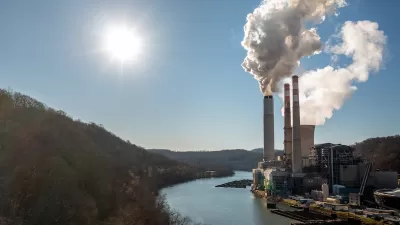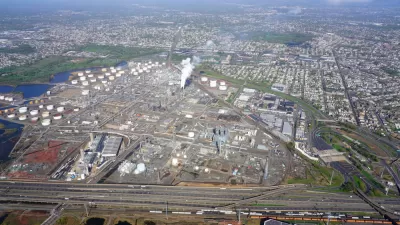New rules from the US Environmental Protection Agency to regulate greenhouse gas emissions from fossil fuel-fired power plants survived an attempt by 25 Republican-led states to block their implementation while their case is litigated.

“A federal appeals court on Friday unanimously denied a lawsuit from a coalition of Republican attorneys general and the fossil fuel industry seeking to block the Environmental Protection Agency’s (EPA) pollution standards for power plants,” wrote Zack Budryk, energy and environment reporter for The Hill on July 19.
As noted in an earlier post on May 14, 25 Republican-led states waited for EPA's “Greenhouse Gas Standards and Guidelines for Fossil Fuel-Fired Power Plants," which includes the “New Source Performance Standards for Greenhouse Gas Emissions from New, Modified, and Reconstructed Fossil Fuel-Fired Electric Generating Units,” to be published in the Federal Register before filing suit to stay the new rules.
The May 9 press release from the Georgia attorney general's office claimed that the “rule also disregards a prior opinion from the U.S. Supreme Court in West Virginia v. EPA, which warned that the EPA should not use a narrow regulatory provision to force coal-fired power plants into retirement.”
“In its [three-page] ruling [pdf], the [three-judge] panel disagreed, writing that ‘petitioners have not shown they are likely to succeed on [their] claims given the record in this case,’” adds Budryk of The Hill.
Nor does this case implicate a major question under West Virginia v. EPA … because EPA has claimed only the power to "set emissions limits under Section 111 [of the Clean Air Act] based on the application of measures that would reduce pollution by causing the regulated source to operate more cleanly[,]" a type of conduct that falls well within EPA’s bailiwick.
“The court will now begin considering the case on the merits,” notes the Environmental Defense Fund, which had filed an amicus brief [pdf] on June 11 in support of the EPA, at the end of its July 19th press release.
We will continue to strongly defend EPA’s cost-effective and achievable carbon pollution standards for power plants.
Musical chairs for power plant emissions rules?
The power plant emissions rule dates back to the Obama administration [Planetizen: EPA Releases Carbon-Cutting Rule for Existing Power Plants, June 3, 2014], when it was known as the Clean Power Plan rule, which was nullified by the aforementioned landmark Supreme Court ruling, West Virginia vs. EPA. [Docket #20-1530] on June 30, 2022. The new EPA rules officially repeal the Trump administration's Affordable Clean Energy rule.
Should the former president return to office next year, the second Trump administration's EPA will likely redo the rules which have deadlines for compliance of 2030 or 2032.
However, the next stop for the rules may be the Supreme Court.
“We plan to seek a stay from the U.S. Supreme Court as soon as possible,” West Virginia Attorney General Patrick Morrissey’s (R) office told The Hill.
Additional reading on the appeals court ruling can be found in the Associated Press article by their climate, environment & energy policy reporter, Matthew Daly. Daly also describes the carbon capture aspects of the new rules which also apply natural gas power plants, as does the earlier Planetizen post on the new rules.

Planetizen Federal Action Tracker
A weekly monitor of how Trump’s orders and actions are impacting planners and planning in America.

Congressman Proposes Bill to Rename DC Metro “Trump Train”
The Make Autorail Great Again Act would withhold federal funding to the system until the Washington Metropolitan Area Transit Authority (WMATA), rebrands as the Washington Metropolitan Authority for Greater Access (WMAGA).

The Simple Legislative Tool Transforming Vacant Downtowns
In California, Michigan and Georgia, an easy win is bringing dollars — and delight — back to city centers.

The States Losing Rural Delivery Rooms at an Alarming Pace
In some states, as few as 9% of rural hospitals still deliver babies. As a result, rising pre-term births, no adequate pre-term care and harrowing close calls are a growing reality.

The Small South Asian Republic Going all in on EVs
Thanks to one simple policy change less than five years ago, 65% of new cars in this Himalayan country are now electric.

DC Backpedals on Bike Lane Protection, Swaps Barriers for Paint
Citing aesthetic concerns, the city is removing the concrete barriers and flexposts that once separated Arizona Avenue cyclists from motor vehicles.
Urban Design for Planners 1: Software Tools
This six-course series explores essential urban design concepts using open source software and equips planners with the tools they need to participate fully in the urban design process.
Planning for Universal Design
Learn the tools for implementing Universal Design in planning regulations.
Smith Gee Studio
City of Charlotte
City of Camden Redevelopment Agency
City of Astoria
Transportation Research & Education Center (TREC) at Portland State University
US High Speed Rail Association
City of Camden Redevelopment Agency
Municipality of Princeton (NJ)






























